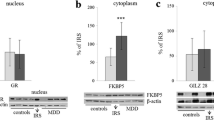Abstract
Klotho is a humoral factor with pleiotropic effects. Most notably, Klotho deficiency is associated with a phenotype comprising organ manifestations accompanying aging including atherosclerosis and cognitive impairment. Research on the role of Klotho in affective disorder is scarce, which is surprising in light of the fact that depression is associated with accelerated cellular aging as well as aging-related phenotypes and comorbidity observed in Klotho deficiency. Soluble α-Klotho (sKlotho) serum levels in patients with a major depressive episode and either undergoing electroconvulsive therapy (n = 16) or a monotherapy with an antidepressant (n = 37) were investigated. We measured the sKlotho serum levels in those patients before and after treatment and compared the baseline levels with those of age-matched healthy controls (n = 39). No group differences were found between the baseline sKlotho levels of patients and controls (573.5 pg/ml vs. 563.8 pg/ml; p = 0.80) and between pre- and post-treatment in the patients with depression (563.8 pg/ml vs. 561.8 pg/ml; p = 0.15), when treated either with electroconvulsive therapy or antidepressant. The major limitation of our study might be that peripheral material such as serum might not reliably reflect processes in the central nervous system. In sum, this first study on peripheral sKlotho levels in a clinical sample cannot confirm a global Klotho dysregulation in depression as it has been already suggested by others. Nonetheless, further preclinical and clinical studies on the involvement of Klotho in affective disorders should be carried out.
Similar content being viewed by others
References
Aksay SS et al (2016) Serum lipid profile changes after successful treatment with electroconvulsive therapy in major depression: a prospective pilot trial. J Affect Disord 189:85–88
Arking DE et al (2002) Association of human aging with a functional variant of klotho. Proc Natl Acad Sci USA 99:856–861
Carney RM, Freedland KE (2017) Depression and coronary heart disease. Nat Rev Cardiol 14:145–155
Crasto CL, Semba RD, Sun K, Cappola AR, Bandinelli S, Ferrucci L (2012) Relationship of low-circulating “anti-aging” Klotho hormone with disability in activities of daily living among older community-dwelling adults. Rejuvenation Res 15:295–301
Dubal DB et al (2014) Life extension factor Klotho enhances cognition. Cell Rep 7:1065–1076
Dubal DB et al (2015) Life extension factor klotho prevents mortality and enhances cognition in hAPP transgenic mice. J Neurosci 35:2358–2371
Gilles M et al (2014) Increased left ventricular mass in hypercortisolemic depressed patients: a hypothesis based on a case series. Med Hypotheses 83:730–732
Gold PW, Licinio J, Pavlatou MG (2013) Pathological parainflammation and endoplasmic reticulum stress in depression: potential translational targets through the CNS insulin, klotho and PPAR-gamma systems. Mol Psychiatry 18:154–165
Hoyer C et al (2018) Electroconvulsive therapy enhances the anti-ageing hormone Klotho in the cerebrospinal fluid of geriatric patients with major depression. Eur Neuropsychopharmacol 28:428–435
Hsieh CC, Kuro-o M, Rosenblatt KP, Brobey R, Papaconstantinou J (2010) The ASK1-Signalosome regulates p38 MAPK activity in response to levels of endogenous oxidative stress in the Klotho mouse models of aging. Aging (Albany NY) 2:597–611
Hu MC, Shi M, Zhang J, Quinones H, Griffith C, Kuro-o M, Moe OW (2011) Klotho deficiency causes vascular calcification in chronic kidney disease. J Am Soc Nephrol JASN 22:124–136
Hu MC, Shiizaki K, Kuro-o M, Moe OW (2013) Fibroblast growth factor 23 and Klotho: physiology and pathophysiology of an endocrine network of mineral metabolism. Annu Rev Physiol 75:503–533
Hu MC et al (2015) Klotho and phosphate are modulators of pathologic uremic cardiac remodeling. J Am Soc Nephrol JASN 26:1290–1302
Kranaster L et al (2019) Biomarkers for antidepressant efficacy of electroconvulsive therapy: an exploratory cerebrospinal fluid study. Neuropsychobiology 77:13–22
Kunert SK, Hartmann H, Haffner D, Leifheit-Nestler M (2017) Klotho and fibroblast growth factor 23 in cerebrospinal fluid in children. J Bone Miner Metab 35:215–226
Kuro-o M (2010) Overview of the FGF23-Klotho axis. Pediatr Nephrol 25:583–590
Kurosu H et al (2005) Suppression of aging in mice by the hormone Klotho. Science 309:1829–1833
Li SA, Watanabe M, Yamada H, Nagai A, Kinuta M, Takei K (2004) Immunohistochemical localization of Klotho protein in brain, kidney, and reproductive organs of mice. Cell Struct Funct 29:91–99
Lin Y, Sun Z (2015) Antiaging gene Klotho attenuates pancreatic beta-cell apoptosis in type 1 diabetes. Diabetes 64:4298–4311
Parker GB, Brotchie H, Graham RK (2017) Vitamin D and depression. J Affect Disord 208:56–61
Pavlatou MG, Remaley AT, Gold PW (2016) Klotho: a humeral mediator in CSF and plasma that influences longevity and susceptibility to multiple complex disorders, including depression. Transl Psychiatry 6:e876
Pizzi C et al (2012) Pathophysiological mechanisms linking depression and atherosclerosis: an overview. J Biol Regul Homeost Agents 26:775–782
Prather AA, Epel ES, Arenander J, Broestl L, Garay BI, Wang D, Dubal DB (2015) Longevity factor Klotho and chronic psychological stress. Transl Psychiatry 5:e585
Scharnholz B et al (2014) Do depressed patients without activation of the hypothalamus-pituitary-adrenal (HPA) system have metabolic disturbances? Psychoneuroendocrinology 39:104–110
Semba RD et al (2011) Plasma Klotho and mortality risk in older community-dwelling adults. J Gerontol 66:794–800
Verhoeven JE, Revesz D, Epel ES, Lin J, Wolkowitz OM, Penninx BW (2014) Major depressive disorder and accelerated cellular aging: results from a large psychiatric cohort study. Mol Psychiatry 19:895–901
Yamamoto M et al (2005) Regulation of oxidative stress by the anti-aging hormone Klotho. J Biol Chem 280:38029–38034
Yokoyama JS et al (2015) Variation in longevity gene Klotho is associated with greater cortical volumes. Ann Clin Transl Neurol 2:215–230
Acknowledgements
LK received support from the German Research Foundation (DFG Grant no. KR 4689/3-1).
Author information
Authors and Affiliations
Corresponding author
Ethics declarations
Conflict of interest
The authors declare that they have no conflict of interest.
Additional information
Publisher's Note
Springer Nature remains neutral with regard to jurisdictional claims in published maps and institutional affiliations.
Rights and permissions
About this article
Cite this article
Sartorius, A., Gilles, M., Pfeifer, AM. et al. Peripheral levels of the anti-aging hormone Klotho in patients with depression. J Neural Transm 126, 771–776 (2019). https://doi.org/10.1007/s00702-019-02008-w
Received:
Accepted:
Published:
Issue Date:
DOI: https://doi.org/10.1007/s00702-019-02008-w




